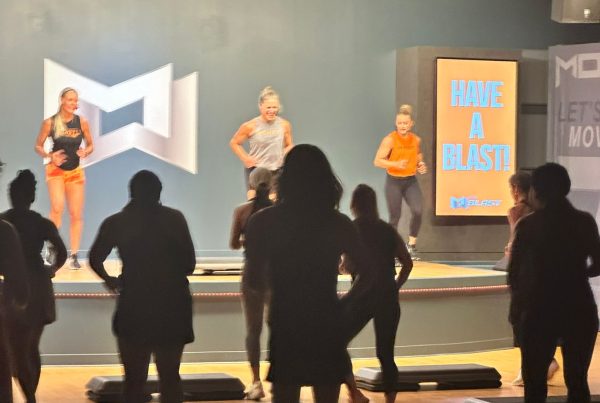Antony Stewart, Digital Fitness Director – Europe at Johnson Digital Studios, explores the psychological challenges experienced by group X instructors and how to improve your mental resilience.
Group X instructors have a lot in common with professional sports people. For starters, they put their body through a lot, albeit without the same level of medical support. Over the course of a typical week, they may actually exercise more, especially if they teach workouts where participation is expected.
They also put their heart and soul on the line every day by performing in front of large groups of people. Some class participants are regular familiar faces; at other times there can be a room full of strangers. Both situations can offer significant psychological challenges.
The professional and personal life of athletes and instructors certainly have much in common. Typically, both have participated in sport from a very young age, engaging sometimes in early sport or exercise specialisation, leading to the loss of personal autonomy and childhood freedom that sometimes results.
Both groups live their professional life under the shadow of potential and actual injury, with income and livelihood incredibly precarious due to the mostly self-employed nature of both roles. Both work in an environment where physical comparison is normalised, sometimes leading to disorderly eating and exercising. Insomnia from late-evening, high-intensity activity is also something that athletes and instructors have to contend with.
Can the stresses of performing to a consistently high level, under pressure, in front of a large group of people be reduced through the acquisition and application of psychological skills? Absolutely. These techniques have widespread use in professional sport, so in what ways can these skills be beneficial in a group-exercise setting?
Psych skills can both enhance performance and provide greater enjoyment during an activity. They can give the user more focus, self-control, self-belief, persistence and pressure management ability, which can lead to greater mental toughness and higher satisfaction with work. Let’s take a look at a handful of these techniques.
Imagery
The use of imagery is a great way to improve confidence and concentration in stressful situations. Imagined events activate muscles, strengthening neural pathways and adding to that mind-body connection, allowing the brain to code repeated patterns. This code allows you to rely on your automatic brain more in challenging environments.
The idea is to create a mental blueprint in advance of the activity, including everything from the location to the clothes you will be wearing and the music you will be hearing. Use all of the different senses, so decide what you might smell and think about what exactly people might say to you. I always personally go and visit a location in advance and stand in the exact area where I will be performing.
Pressure
Despite all this mental imagery preparation, you will still feel nerves on the day. According to the explicit monitoring hypothesis, pressure can increase conscious reinvestment into skills that are normally automatic for you. This is an example of one of those moments when you might question if you will remember your choreography and programming. You may also start to think about how you sound on the mic or question the way in which you execute a particular exercise – despite knowing all of these skills by heart in normal (less-pressurised) circumstances. All of this conscious reinvestment in previously mastered skills can be incredibly detrimental to performance. As your mental, neural system moves from skill to fear, the threat stimuli causes a drop in your motor skills.
Quiet Eye Training is a great technique for reducing threat anxiety, by shifting your fixation onto something that is not threatening, preventing the reinvestment process in advance. I bring a well-loved teddy bear with me, for example, when I am filming digital fitness. Focusing on the teddy behind the cameras allows me to avoid thinking about the workout ahead. I have already practised enough and therefore will take no benefit from going through it again in my head.
Self-talk
Positive self-talk is a great tool for motivation and self-regulation. It helps to control your thoughts and can remind you of a desired process at key times. Examples include, “You have done this many times before”; “You love doing this”; “The participants have come because they love my classes.”
Have some of these ready to fall back on in difficult situations. They can be put to memory or written on a water bottle or on the back of your phone.
Resilience
Aside from these practical techniques, the attribute that I would argue to be the number one factor in forging a long-term and rewarding career as a group exercise professional is that of resilience. Psychology can also help us with self-regulation strategies to build resilience. An example would be the use of reframing. For example, try rethinking negative thoughts from a different perspective, such as reframing anxiety as excitement. They feel very similar sometimes in a high-pressure situation.
Avoid thinking and decision making when you are tired or hungry. When irrational thoughts come into your head, challenge yourself to re-consider in the morning or after dinner. There are lots of common irrational thoughts and you may be familiar with some of these: perfection is possible; a catastrophe is around the corner; my worth depends on achievements; polarised thinking; over-generalisation; the fallacy of fairness.
Many aspects of resilience can derive from resources you may not have direct control over yourself. These examples would include having a network of strong social support, high levels of personal optimism, motivation and being able to work in an environment that you authentically enjoy. Even if you cannot control those things at the present time, being aware of the benefits of focusing on these things could help you improve your resilience over time.
Author Bio:

Antony Stewart







